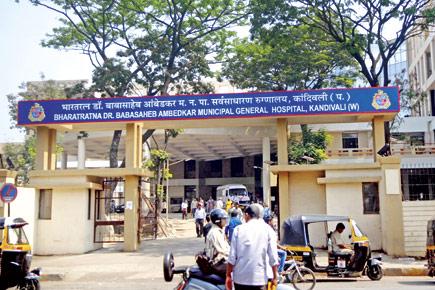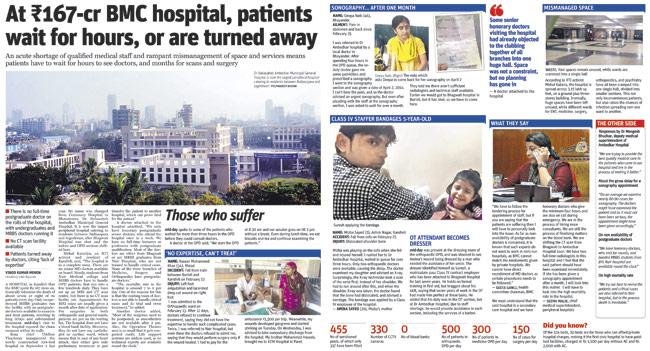An RTI query has revealed that the refurbished Dr Babasaheb Ambedkar Municipal General Hospital in Kandivli has seen 536 deaths in its different wards, since its inauguration in early September last year

In its edition dated February 27, mid-day exposed the rampant mismanagement of services and utter apathy towards patients on display at a recently inaugurated hospital in Kandivli, which was rebuilt at a whopping cost of Rs 167 crore (At Rs 167 cr BMC hospital, patients wait for hours or are turned away).
ADVERTISEMENT

Pic/Pradeep Dhivar
And now, figures obtained under the Right to Information (RTI) Act have confirmed what mid-day had already discovered — over 536 people have lost their lives in less than six months at the Dr Babasaheb Ambedkar Municipal General Hospital. Sena chief Uddhav Thackeray inaugurated the newly constructed 324-bed hospital on September 2, last year. Its was earlier called Centenary Hospital.

On February 27, mid-day had reported on the lack of facilities and and gross delay in treatment and surgeries at the under-staffed civic hospital in Kandivli
Mehul Kataria, an RTI activist from Kandivli, obtained the figures from the civic run hospital. In a reply to the RTI queries, Dr Mangesh Budhkar, deputy medical superintendent of the hospital, admitted that 536 deaths have been reported in the hospital since its inception. This means, on an average 107 patients have died in its premises every month.
At 222, the medicine ward has claimed the maximum number of patients, while 154 deaths have occurred in the Medical Intensive Care Unit (MICU). Not a single organ donation initiative has been undertaken by the hospital. Katariya said, “The hospital is in a complete mess, and there are no senior MD doctors available on board.
The hospital is mostly manned by students from Nair Medical College, and MBBS doctors handle hundreds of OPD patients daily. They have set up an MRI and CT scan centre, but the CT scan facility isn’t on offer. Appointments for MRI scans are given at least a month after registration. For orthopaedic and general surgeries, the patients are put on a waiting list.
The hospital does not have a blood bank facility, nor any cardiologist or cardiac ward, which means that they have to refer patients who come with heart attacks to other hospitals.” In its report, mid-day had revealed that the hospital has only honorary postgraduate senior doctors, who attend the hospital once in a week. It has no full time lecturers or professors with postgraduate degrees.
Most of the doctors are either from Bhagwati Hospital or MBBS graduates from Nair Hospital, who are not trained to handle critical cases. None of the three branches of medicine, surgery and orthopaedics have postgraduate doctors. Dr Ashish Tiwari, CEO, Zynova hospitals, said, “An average number of 107 deaths per month in a hospital with 324 beds is quite alarming.
A thorough hospital audit by independent and impartial agency can bring lots of changes. Many things could be responsible for this — level of medical care and nursing care, availability of life-saving drugs and equipment, promptness and professional skills of paramedical staff, level of ICU care, availability of all senior doctors and operation procedures.”
 Subscribe today by clicking the link and stay updated with the latest news!" Click here!
Subscribe today by clicking the link and stay updated with the latest news!" Click here!






